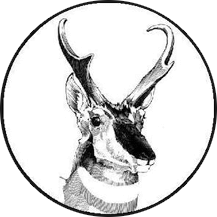About the Committee
Co-Chairs
- Link E. Olson (link.olson@alaska.edu)
- Jesse Alston (jmalston@arizona.edu)
Members
|
|
|
History and Mission
The African Graduate Student Research Fund committee was formed in 2013 as an ad hoc committee and was promoted to a standing committee in 2016. The name was changed to African Research Fellowship in 2021. Its mission is to support the next generation of African mammalogists by awarding individual grants of $1,500 and an online ASM membership to African nationals pursuing graduate degrees. Between 2014 and 2018, 2-3 awards were granted annually; in 2019, 4 proposals were funded, and in 2020 this number increased to 5. The increase in the number of recent awards reflects several generous donations—please consider contributing! The next deadline for applications is 15 April 2024.
2023 Fellows
|
Image
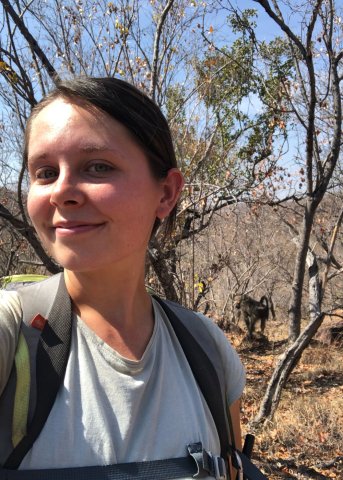 |
Katinka Botha is a master’s student in the school of Animal, Plant and Environmental Sciences at the University of the Witwatersrand (South Africa) studying the effects of landscape drivers on baboon behavior and movement patterns. She is currently working with a troop of chacma baboons (Papio ursinus) and is interested in how seasonal changes in thermal landscape and resources--as well as general perceived predation risk, troop social dynamics, and anthropogenic influence--lead to flexibility in behavior and movement. Despite P. ursinus being a well-studied species, many of the aforementioned drivers of landscape use have been studied in isolation from each other, and she believes it is important to assess trade-offs between these multiple drivers. Katinka hopes to create a broader understanding of baboon behavioral and movement ecology, which is especially necessary under the effects of increasing aridity in southern African ecosystems. This will hopefully inform primate conservation through greater knowledge of how habitat utilization may be altered with climate change. |
| Judicaël Régis Kema Kema is a Ph.D. student in a joint program in Biology of Environment, Populations, and Ecology at the University of La Rochelle (France) and in Physical Geography and Environment at Omar Bongo University (Gabon) investigating the conservation status of cetaceans in Gabonese waters. With anthropogenic pressure resulting in the recurrence of strandings and accidental captures by both industrial and subsistence fishing, it is imperative to know the conservation status of these species. This is all the more necessary as the scientific datasets available are geographically fragmentary and temporally restricted to the recent period. Régis will investigate the abundance, distribution, and preferential habitat of four cetacean species (humpback dolphin, humpback whale, common dolphin, and bottlenose dolphins) in Gabonese waters. To do this, he will collect existing biological datasets and interview local fishermen. All datasets will be used to build species distribution models and estimate abundance. Funding from ASM will support the purchase of a high-performance computer and hard drive for these analyses. |
Image
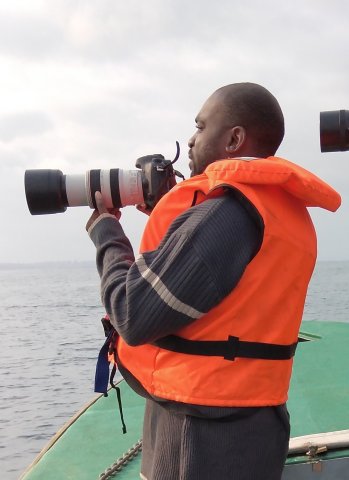 |
|
Image
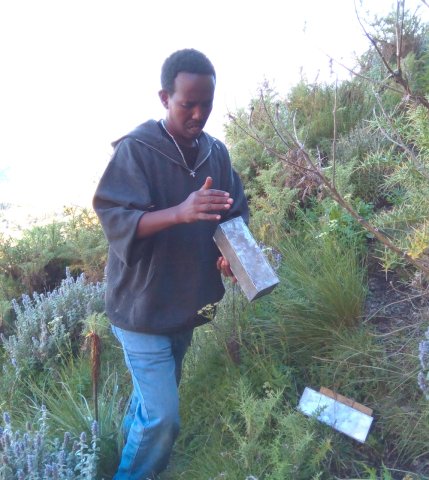 |
Kiros Welegerima is a Ph.D. student in Wildlife Management at the Sokoine University of Agriculture (Tanzania). He is working on the Afroalpine small mammal community of Mount Tsbet in Tigray, Northern Ethiopia. At 4,090 m above sea level, Mount Tsbet is the highest mountain in the Tigray Province. The mountain is covered by agricultural fields and rural villages at the lower elevations and by shrubs and thickets along the steep slopes and valleys. The top of the mountain is typical of an Afroalpine plateau, covered by meadows and providing a 360 degree view of the surrounding mountain chains, Lake Hashenge, unique alpine vegetation, and part of the Great Ethiopian Rift Valley. Little is known about the distribution and ecology of small mammals inhabiting Mount Tsbet, despite its inclusion as part of the Ethiopian Afroalpine mountain blocks and the potential presence of many rare and endemic small mammal species. Kiros's research focuses on rodent community ecology, with an emphasis on understanding the elevational distribution of small mammal species (rodents and shrews) belonging to several genera. By using morphological and molecular data, an accurate and up-to-date list of species will be generated to infer the taxonomic diversity of these small mammals. This study will also support future consideration of other similar mountain habitats in small mammal studies to unearth hidden biological diversity in the region as well as the country. |
Honorable Mention
Three additional 2023 applicants are recognized with Honorable Mention for their outstanding proposals that ASM was nonetheless unable to support due to insufficient funding. These are Eliette Noromalala (Ph.D. student, University of Texas at Austin), Fefy Ravahatramananjarasoa (Ph.D. student, University of Antananarivo), and Ortega Bavary (Ph.D. student, University of Antananarivo).
Reports
Grants & Awards
Recent Recipients
2022 Fellows
|
Image
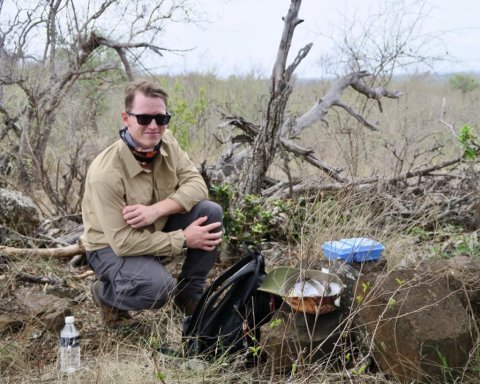 |
Ryan Forbes is a master’s student in the Centre for African Conservation Ecology at the Nelson Mandela University (South Africa) researching carnivore diets and population dynamics as they relate to anthropogenic pressures. With populations declining globally due to prey depletion, habitat loss and fragmentation, human-carnivore conflict, and overharvesting, it is imperative to understand how carnivores respond to these pressures. Ryan will investigate how carnivore diets and dispersal differ in regions with abundant natural prey and low levels of anthropogenic pressure compared to areas depleted of wild prey but with an abundance of livestock and high levels of anthropogenic pressure. To do this, he will examine lion and leopard dispersal and diets in the Greater Limpopo Transfrontier Conservation Area. Funding from ASM will go towards SNP genotyping of DNA extracted from lion and leopard scats, enabling him to examine population structure and gene flow in the study area. |
|
Image
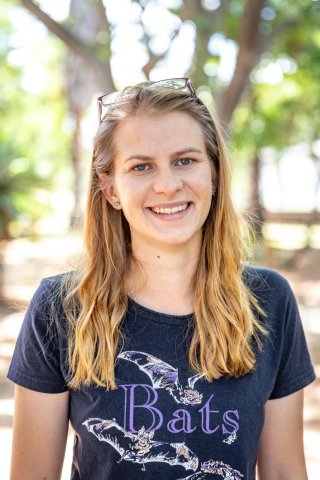 |
Alexandra Howard is a PhD candidate in the Afromontane Research Unit at the University of the Free State (South Africa) studying ecosystem services of bats in deciduous fruit farms of the eastern Free State Province in South Africa. After graduating with a master’s degree in Zoology from the University of Pretoria, Alexandra worked as a research manager and scientific officer in the NGO industry with a focus on endangered species including vultures, rhinoceros, and pangolins. |
|
Image
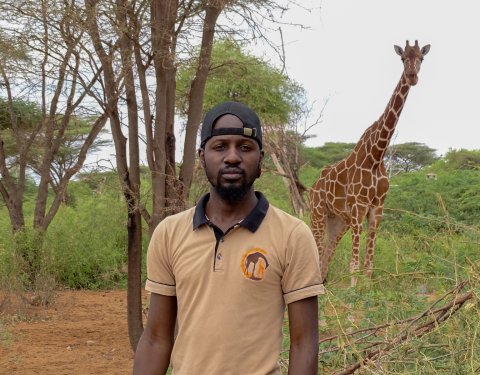 |
Raymond Owino is a master’s student at the University of Nairobi (Kenya) interested in the foraging ecology, human-wildlife conflict, and habitat restoration of large mammals. For his thesis, Raymond is studying the endangered reticulated giraffe in Garissa along the Kenya-Somalia border. Garissa marks the southern extent of the Horn of Africa biodiversity hotspot and is home to more than 60% of the global wild population of reticulated giraffes. However, due to security issues that dissuade researchers in the region, not much is known the biology of its resident giraffes. Raymond’s research focuses on the interactive effects of invasive woody plant species (Acacia reficiens and Prosopis juliflora) and drought on the diet selection of reticulated giraffes. The study will help to determine the cause of giraffe declines in this region and inform habitat restoration efforts aimed at eliminating invasive woody plant species. |
|
Image
|
Felaniaina Rafenoarisoa is a PhD student in Ecology and Biodiversity at the University of Antananarivo (Madagascar) investigating the dietary flexibility and feeding strategy of the white-collared brown lemur (Eulemur cinereiceps) at the newly protected area of Ankarabolava-Angakatrika in southeast Madagascar. With a diet mainly composed by fruit, this species is highly sensitive to habitat degradation. By combining field data on feeding ecology to categorize food intake preferences and phytochemical analyses to assess the nutrient content of consumed fruits, Felaniaina will characterize daily and seasonal food intake both qualitatively and quantitatively. Findings will help guide the selection of tree species for restorative planting while also shedding light on the basic nutritional requirements of this imperiled species. |
|
Image
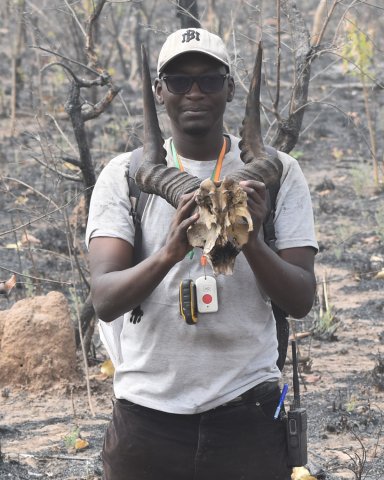 |
Omobayo Ghislain Zouffoun is a PhD student in the Laboratory of Applied Ecology of the University of Abomey-Calavi (Benin) studying the impact of fire regimes on habitat selection by ungulate species in the Pendjari Biosphere Reserve (PBR). Fire is the main ecological driver responsible for the annual rhythm of life in the reserve. Omobayo will compare data from ungulate dung surveys with fire regimes and environmental variables in order to (i) determine the factors governing habitat selection, (ii) identify factors governing patterns of resource selection within burned areas, and iii) assess the influence of body mass and diet on these patterns. Funding from ASM will defray costs associated with hiring a field guide, traveling to the field site, and staying on site during the study period. Results will inform fire-management practices in the PBR that promote the sustainable conservation of ungulate species in general and the endangered topi antelope (Damaliscus lunatus korrigum) in particular. |
2021 Fellows
In 2021 a record 63 eligible applications from citizens of 16 African countries enrolled in 41 institutions spanning 20 countries and 4 continents were submitted. The American Society of Mammalogists congratulates this year’s fellowship recipients, wishes them the best of luck with their research, and looks forward to learning of their results!
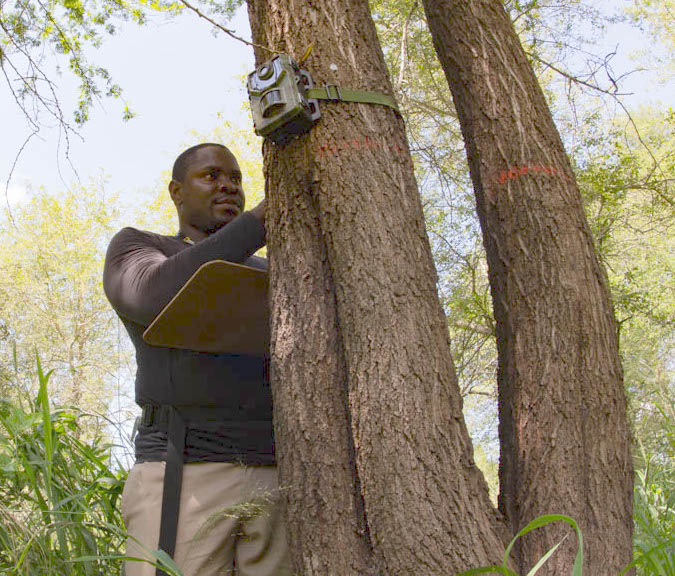 Osvaldo Abrão is a master's student in Conservation Biology at Zambezi University (Mozambique) studying the effects of fire on large mammals in Mozambique’s famed Gorongosa National Park. He is using camera traps purchased with his fellowship to determine the species richness and abundance of mammals under different fire regimes and is also collecting vegetation data on how fire affects mammals through changes in plant quality and abundance. This research forms the basis of what will become a long-term study and is the first of its kind in Mozambique. The results will provide a scientific basis for decisions regarding the use of fire as a management tool in conservation areas and will contribute to a better understanding of savanna ecology.
Osvaldo Abrão is a master's student in Conservation Biology at Zambezi University (Mozambique) studying the effects of fire on large mammals in Mozambique’s famed Gorongosa National Park. He is using camera traps purchased with his fellowship to determine the species richness and abundance of mammals under different fire regimes and is also collecting vegetation data on how fire affects mammals through changes in plant quality and abundance. This research forms the basis of what will become a long-term study and is the first of its kind in Mozambique. The results will provide a scientific basis for decisions regarding the use of fire as a management tool in conservation areas and will contribute to a better understanding of savanna ecology.
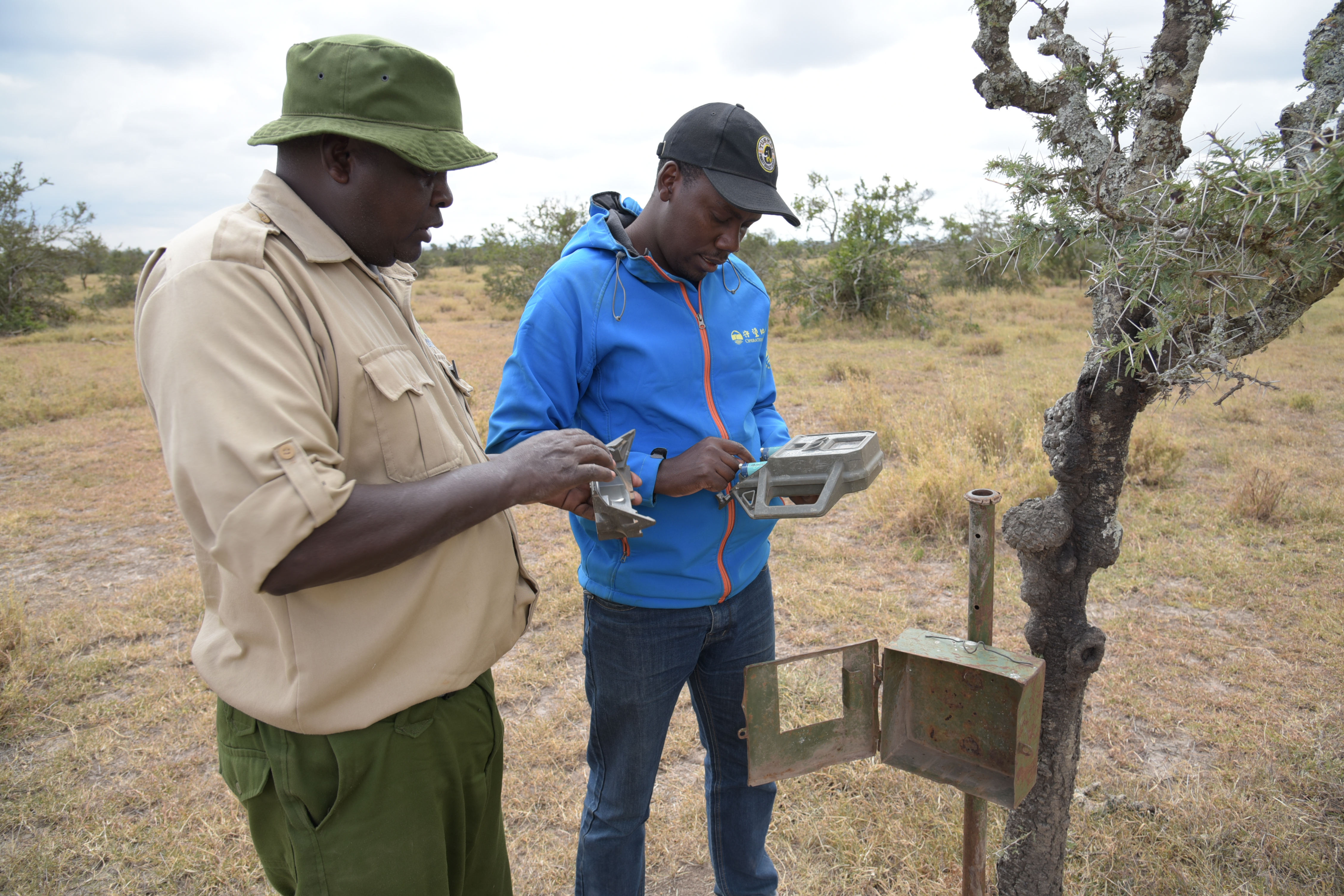 Douglas Kamaru is a master’s student in Conservation Biology at the University of Nairobi (Kenya) studying the effects of invasive big-headed ants (Pheidole megacephala) on predator-prey dynamics between lions (Panthera leo) and their ungulate prey. Likely introduced through international produce imports, big-headed ants have become established throughout the Laikipia Plateau over the past 10-15 years, disrupting a foundational ant-plant protective mutualism by killing and outcompeting native ants that normally defend trees against elephant (Loxodonta africana) browsing. Absent this protection, tree cover has shrunk considerably at Ol Pejeta Conservancy (study site) and across Laikipia. By providing concealment, tree cover facilitates prey capture by large carnivores, particularly lions. Consequently, herbivores avoid areas with high tree cover, perceiving them as riskier than open areas. Douglas’s research will determine whether and how: (1) habitat selection by ungulates is altered by big-headed ant invasion; (2) the outcome of hunting forays by lions is in turn affected by big-headed ant invasion; and (3) altered interactions between lions and their prey will translate to changes in the abundance of each. This research will help Laikipia property managers anticipate the cascading effects of big-headed ant invasion to lions and their prey, potentially helping with the development of mitigation strategies.
Douglas Kamaru is a master’s student in Conservation Biology at the University of Nairobi (Kenya) studying the effects of invasive big-headed ants (Pheidole megacephala) on predator-prey dynamics between lions (Panthera leo) and their ungulate prey. Likely introduced through international produce imports, big-headed ants have become established throughout the Laikipia Plateau over the past 10-15 years, disrupting a foundational ant-plant protective mutualism by killing and outcompeting native ants that normally defend trees against elephant (Loxodonta africana) browsing. Absent this protection, tree cover has shrunk considerably at Ol Pejeta Conservancy (study site) and across Laikipia. By providing concealment, tree cover facilitates prey capture by large carnivores, particularly lions. Consequently, herbivores avoid areas with high tree cover, perceiving them as riskier than open areas. Douglas’s research will determine whether and how: (1) habitat selection by ungulates is altered by big-headed ant invasion; (2) the outcome of hunting forays by lions is in turn affected by big-headed ant invasion; and (3) altered interactions between lions and their prey will translate to changes in the abundance of each. This research will help Laikipia property managers anticipate the cascading effects of big-headed ant invasion to lions and their prey, potentially helping with the development of mitigation strategies.
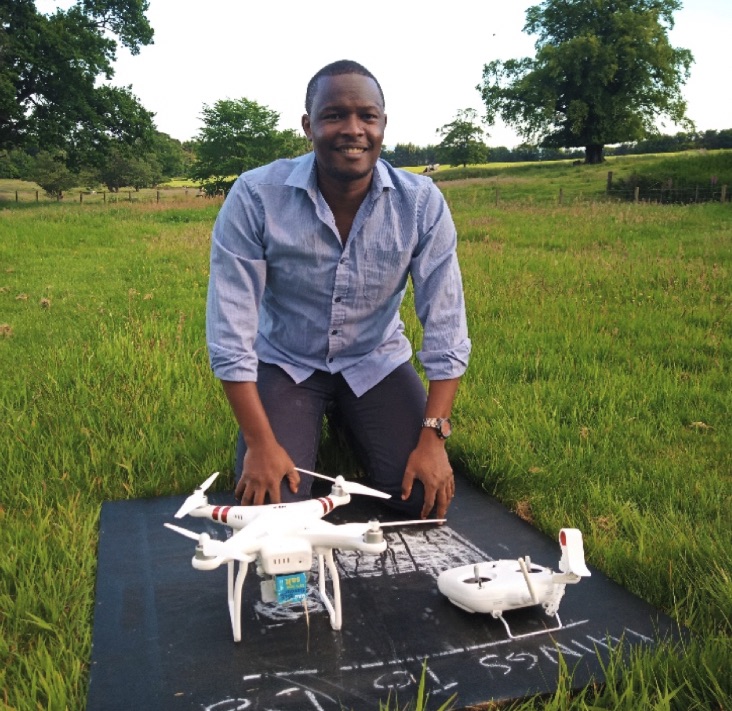 Cyrus Kavwele is a Ph.D. student in the College of Science and Engineering at the University of Glasgow (United Kingdom) whose research focuses on the social structure and group decision-making of blue wildebeest (Connochaetes taurinus) along a disturbance gradient in Serengeti National Park, Tanzania. Although substantial research has focused on how movement ecology is driven by environmental and landscape factors, little is known about the role of social-interaction rules in group-living migratory species, largely due to the difficulties in collecting multidimensional data necessary for quantifying social interactions. Using drones, long-range (LoRa) communication radios, and high-frequency GPS tags, Cyrus is developing methods for filling this knowledge gap. His research will contribute to our understanding of the role of social interaction rules in collective behavior and navigation in group-living species.
Cyrus Kavwele is a Ph.D. student in the College of Science and Engineering at the University of Glasgow (United Kingdom) whose research focuses on the social structure and group decision-making of blue wildebeest (Connochaetes taurinus) along a disturbance gradient in Serengeti National Park, Tanzania. Although substantial research has focused on how movement ecology is driven by environmental and landscape factors, little is known about the role of social-interaction rules in group-living migratory species, largely due to the difficulties in collecting multidimensional data necessary for quantifying social interactions. Using drones, long-range (LoRa) communication radios, and high-frequency GPS tags, Cyrus is developing methods for filling this knowledge gap. His research will contribute to our understanding of the role of social interaction rules in collective behavior and navigation in group-living species.
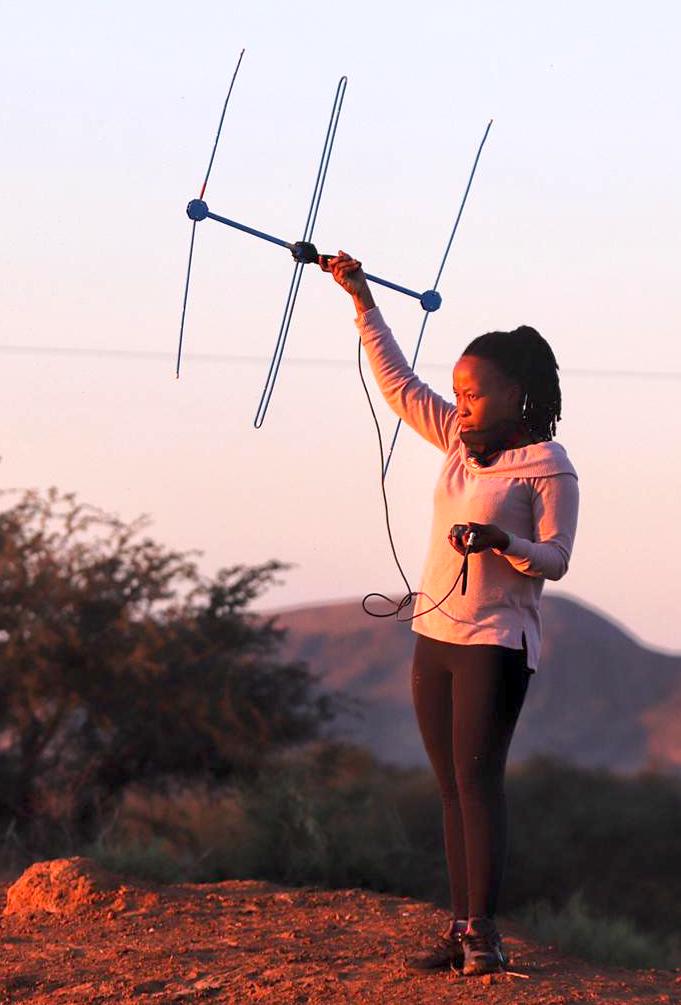 Makabudi Valery Phakoago is a Ph.D. student in Wildlife Conservation Physiology at the University of the Witwatersrand (South Africa). Climate change, which is resulting in hotter and drier environments throughout most of Africa, may affect animals either directly (e.g., through the effects of heat on physiological performance) or indirectly (e.g., through changes in the availability of prey resources). Ants and termites represent key prey items for myrmecophagous mammals and are likely to be adversely affected by climate change. Makabudi is investigating the population densities, habitat preferences, diets, and activity patterns of two such mammals—the aardvark (Orycteropus afer) and ground pangolin (Smutsia temminckii)—in South Africa’s Tswalu Kalahari Reserve. Her fieldwork will include tracking radio-tagged animals to understand habitat preferences, collecting scat samples for diet analysis, and recording behavior to assess activity patterns across the year and in response to changing food availability. Funding from ASM will support the purchase of miniature tracking transmitters for six juvenile pangolins in order to determine for the first time how juveniles disperse meet the associated energetic costs.
Makabudi Valery Phakoago is a Ph.D. student in Wildlife Conservation Physiology at the University of the Witwatersrand (South Africa). Climate change, which is resulting in hotter and drier environments throughout most of Africa, may affect animals either directly (e.g., through the effects of heat on physiological performance) or indirectly (e.g., through changes in the availability of prey resources). Ants and termites represent key prey items for myrmecophagous mammals and are likely to be adversely affected by climate change. Makabudi is investigating the population densities, habitat preferences, diets, and activity patterns of two such mammals—the aardvark (Orycteropus afer) and ground pangolin (Smutsia temminckii)—in South Africa’s Tswalu Kalahari Reserve. Her fieldwork will include tracking radio-tagged animals to understand habitat preferences, collecting scat samples for diet analysis, and recording behavior to assess activity patterns across the year and in response to changing food availability. Funding from ASM will support the purchase of miniature tracking transmitters for six juvenile pangolins in order to determine for the first time how juveniles disperse meet the associated energetic costs.
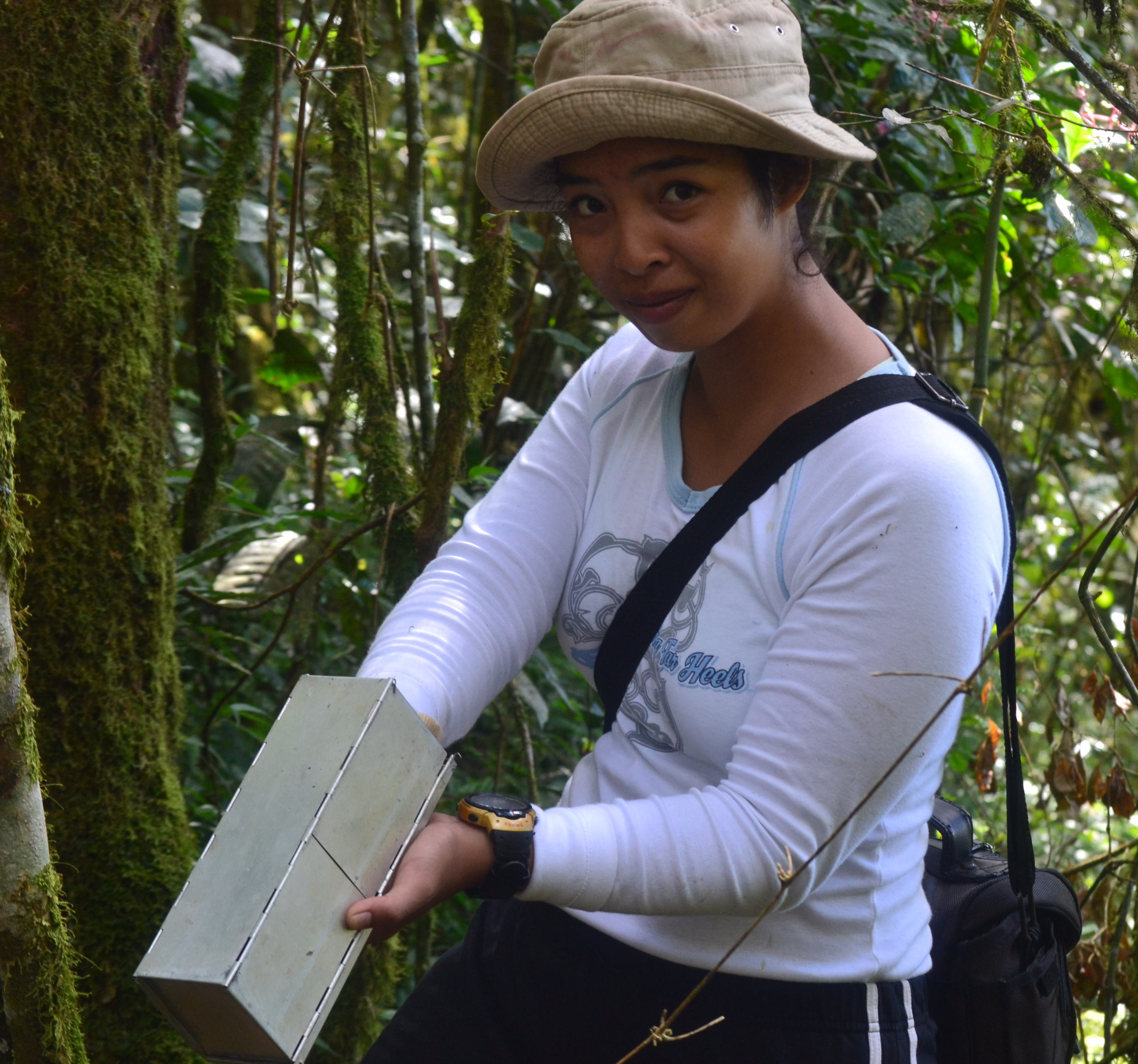 Veronarindra Ramananjato is a Ph.D. student in Integrative Biology at the University of California Berkeley (USA) examining the effects of the disruption of plant-animal interactions on tropical forests. Towards that end, she is investigating how the world’s smallest primates—mouse lemurs (Microcebus spp.)—influence forest integrity via seed dispersal in Madagascar’s Ranomafana National Park. Her fieldwork includes the use of fluorescent powder tracking to follow the movements of these nocturnal omnivores in order to measure their dispersal distances, the collection of seeds from their feces to identify any differences in plant species dispersed by males versus females, and an examination of how these behaviors may vary between forest edges and forest cores. Vero’s project will contribute to the current scientific knowledge on the ecological role of nocturnal, small-bodied, omnivorous species and advance our understanding of seed-dispersal ecology in tropical forest ecosystems.
Veronarindra Ramananjato is a Ph.D. student in Integrative Biology at the University of California Berkeley (USA) examining the effects of the disruption of plant-animal interactions on tropical forests. Towards that end, she is investigating how the world’s smallest primates—mouse lemurs (Microcebus spp.)—influence forest integrity via seed dispersal in Madagascar’s Ranomafana National Park. Her fieldwork includes the use of fluorescent powder tracking to follow the movements of these nocturnal omnivores in order to measure their dispersal distances, the collection of seeds from their feces to identify any differences in plant species dispersed by males versus females, and an examination of how these behaviors may vary between forest edges and forest cores. Vero’s project will contribute to the current scientific knowledge on the ecological role of nocturnal, small-bodied, omnivorous species and advance our understanding of seed-dispersal ecology in tropical forest ecosystems.
2020 Award Winners
In 2020 24 applications from citizens of 12 African countries enrolled in 20 institutions spanning 15 countries and three continents were submitted. The American Society of Mammalogists congratulates this year’s successful applicants and those receiving honorable mention, wishes them the best of luck with their research, and looks forward to learning of their results!
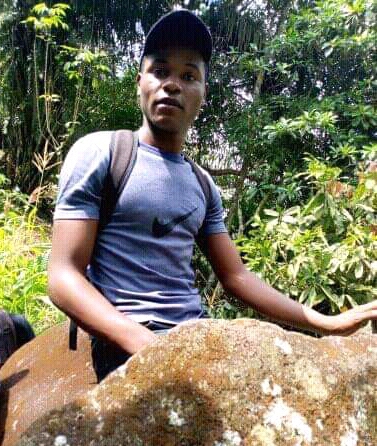 Valorian Douatsop is a master's student in Ecology and Wildlife Management at the University of Dschang (Cameroon) studying the ecology of Africa’s most elusive cat species, the African golden cat. Specifically, he is investigating the primary direct and indirect threats leading to the decline of the species using rapid camera-trap surveys. He will also survey bushmeat markets and illegal local wildlife trading hubs to better understand the magnitude of the role of indiscriminate snaring on African golden cat populations. Valorian will use funds from his award to pay for travel and accommodation to and from his field sites. Results from his work will provide the first baseline data on African golden cats in Cameroon, including estimates of abundance/density and occupancy. Results will enable the establishment of a database of prices in key consumer markets to understand demand demographics and attitudes and to inform the development of improved demand-reduction strategies.
Valorian Douatsop is a master's student in Ecology and Wildlife Management at the University of Dschang (Cameroon) studying the ecology of Africa’s most elusive cat species, the African golden cat. Specifically, he is investigating the primary direct and indirect threats leading to the decline of the species using rapid camera-trap surveys. He will also survey bushmeat markets and illegal local wildlife trading hubs to better understand the magnitude of the role of indiscriminate snaring on African golden cat populations. Valorian will use funds from his award to pay for travel and accommodation to and from his field sites. Results from his work will provide the first baseline data on African golden cats in Cameroon, including estimates of abundance/density and occupancy. Results will enable the establishment of a database of prices in key consumer markets to understand demand demographics and attitudes and to inform the development of improved demand-reduction strategies.
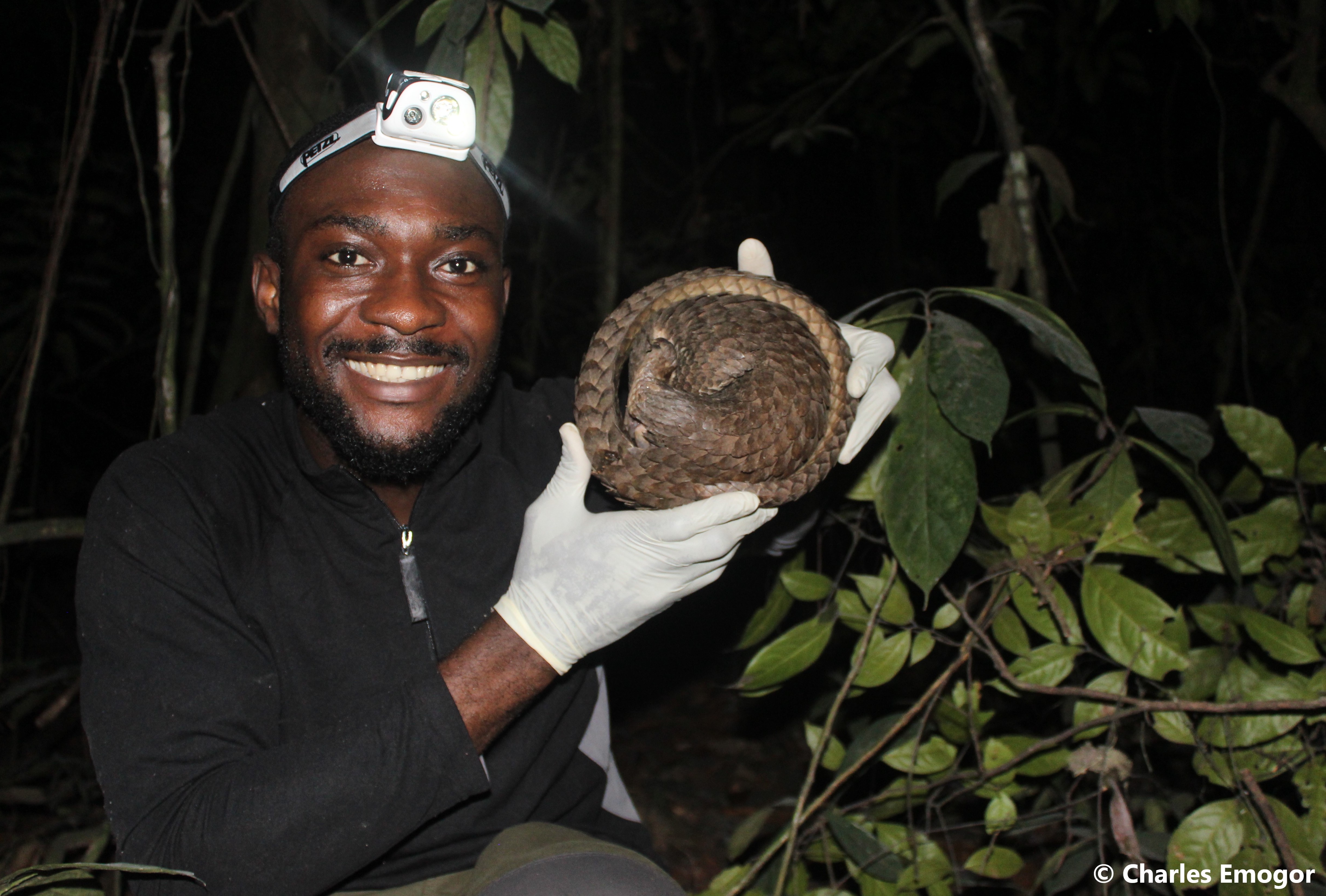 Charles Emogor is a PhD student in Zoology at the University of Cambridge studying the ecology and status of the white-bellied pangolin. He combines social and ecological methods to understand human pressures on the world’s most trafficked wild mammal and provide useful insights into their ecology which is currently limited. Facets of his research which is mainly conducted in and around Nigeria’s Cross River National Park include, characterisation of Nigeria’s role in the global illegal pangolin trade, characterisation of local consumption and demand, quantification of pangolin offtake and understanding the ranging behaviour of the white-bellied pangolin. Charles is also collaborating with the Centre for Conservation Biology (University of Washington) to develop a genetic database for identifying the geographic origin of seized pangolin materials which will better inform law enforcement activities. Charles’ work which is supervised by Professor Andrew Balmford and funded by the Gates Cambridge Trust will undoubtedly provide badly needed information for evidence-based pangolin conservation in Nigeria.
Charles Emogor is a PhD student in Zoology at the University of Cambridge studying the ecology and status of the white-bellied pangolin. He combines social and ecological methods to understand human pressures on the world’s most trafficked wild mammal and provide useful insights into their ecology which is currently limited. Facets of his research which is mainly conducted in and around Nigeria’s Cross River National Park include, characterisation of Nigeria’s role in the global illegal pangolin trade, characterisation of local consumption and demand, quantification of pangolin offtake and understanding the ranging behaviour of the white-bellied pangolin. Charles is also collaborating with the Centre for Conservation Biology (University of Washington) to develop a genetic database for identifying the geographic origin of seized pangolin materials which will better inform law enforcement activities. Charles’ work which is supervised by Professor Andrew Balmford and funded by the Gates Cambridge Trust will undoubtedly provide badly needed information for evidence-based pangolin conservation in Nigeria.
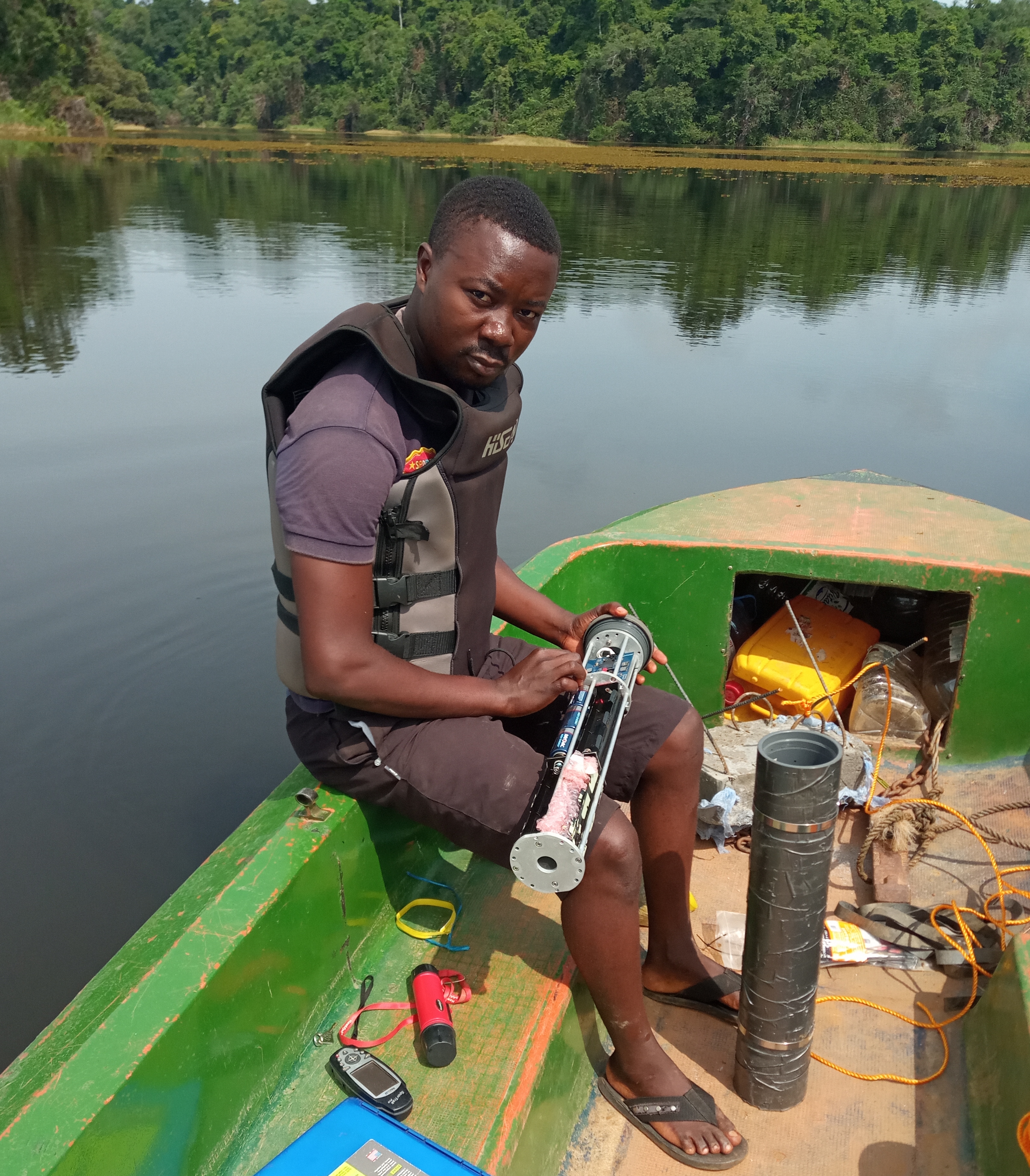 Clinton Factheu is a Ph.D. student in the Department of Animal Biology and Physiology at the University of Yaoundé I (Cameroon). His project focuses on the use of passive acoustics to assess the impact of the giant salvinia on the African manatee’s habitat use in Lake Ossa. Giant salvinia is an exotic, free-floating aquatic fern that has invaded approximately 25% of the lake, which is considered a manatee sanctuary in Cameroon. Clinton deploys hydrophones in the lake to compare the African manatee’s occurrence patterns in invaded versus non-invaded areas. Results of his project will help direct manatee conservation efforts in the Lake Ossa Wildlife Reserve.
Clinton Factheu is a Ph.D. student in the Department of Animal Biology and Physiology at the University of Yaoundé I (Cameroon). His project focuses on the use of passive acoustics to assess the impact of the giant salvinia on the African manatee’s habitat use in Lake Ossa. Giant salvinia is an exotic, free-floating aquatic fern that has invaded approximately 25% of the lake, which is considered a manatee sanctuary in Cameroon. Clinton deploys hydrophones in the lake to compare the African manatee’s occurrence patterns in invaded versus non-invaded areas. Results of his project will help direct manatee conservation efforts in the Lake Ossa Wildlife Reserve.
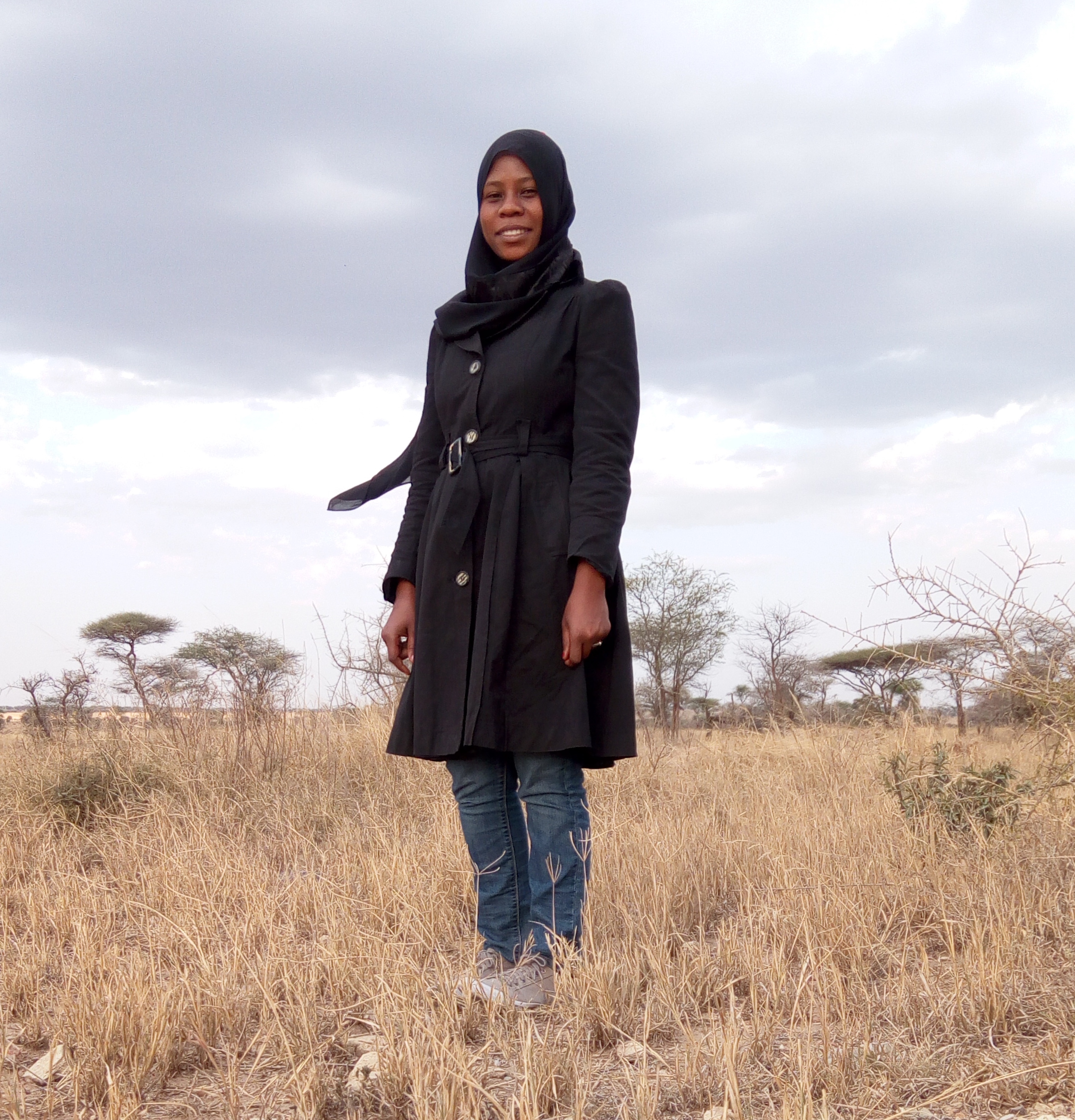 Zabibu Kabalika is pursuing a Ph.D. in movement ecology in the Institute of Biodiversity, Animal Health and Comparative Medicine at the University of Glasgow (United Kingdom). Movement forms a fundamental aspect of life of every living organism, and understanding extents and patterns of movement is key to most biological questions. However, its quantification across individuals and populations has always remained methodologically challenging, especially in retrospective situations where live animals can no longer be tracked. Zabibu is using stable-isotope signatures in tail hair to study movement patterns of African ungulates across protected areas in her home country of Tanzania in order to better understand connectivity and its stability since colonial times.
Zabibu Kabalika is pursuing a Ph.D. in movement ecology in the Institute of Biodiversity, Animal Health and Comparative Medicine at the University of Glasgow (United Kingdom). Movement forms a fundamental aspect of life of every living organism, and understanding extents and patterns of movement is key to most biological questions. However, its quantification across individuals and populations has always remained methodologically challenging, especially in retrospective situations where live animals can no longer be tracked. Zabibu is using stable-isotope signatures in tail hair to study movement patterns of African ungulates across protected areas in her home country of Tanzania in order to better understand connectivity and its stability since colonial times.
Aristide Sock Bell, Jr., is a Ph.D. student in Zoology at the Faculty of Science of the University of Douala (Cameroon) investigating the relationship between urbanization and bat population structure in the littoral region of Cameroon, with an emphasis on conservation and public health. His fieldwork includes collecting haemoparasites and ectoparasites from bats mistnetted in urban, peri-urban, and the Ebo Forest (a proposed National Park). ASM funding will support Aristide’s travel to and from study sites, personnel costs, and and the purchase of supplies. The results of his research will have broad implications for conservation, ecology, and local public health.
2020 Honorable Mention
Two additional applicants are recognized for their outstanding proposals that ASM was nonetheless unable to support due to insufficient funding (please help by donating here!). Ashleigh Donaldson (University of the Witwatersrand, South Africa) is studying thermoregulation and water conservation mechanisms in lions for her Ph.D. and Boris Otchika (Masuku University of Science and Technology, Gabon) is investigating the relative contribution of duikers to the overall biomass of Central African forests for his Ph.D.
2019 Award Winners
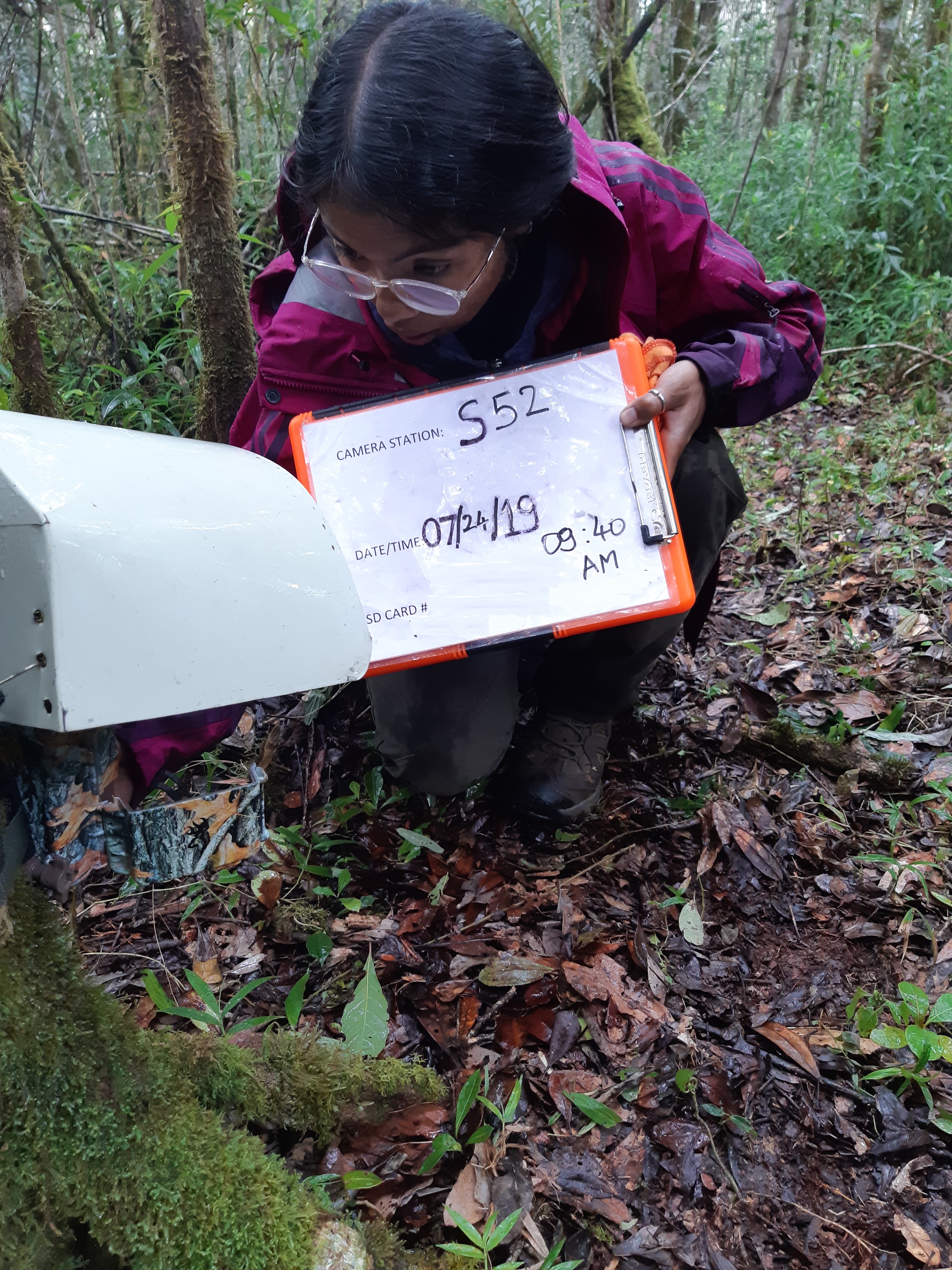 Prisca Razafy is a PhD student in Zoology and Animal Biodiversity at the University of Antananarivo (Madagascar). She is investigating ecological niche partitioning among sympatric, native, small-bodied carnivore species and their responses to the invasion of non-native carnivores at forest sites within and around Mantadia National Park, Madagascar. Using a combination of camera traps and GPS collars, Prisca is documenting habitat selection in both groups. ASM funding will enable her to purchase additional equipment and pay field assistants, and the results of her study will both advance ecological theory and inform management decisions affecting Madagascar's declining, forest-dwelling carnivores.
Prisca Razafy is a PhD student in Zoology and Animal Biodiversity at the University of Antananarivo (Madagascar). She is investigating ecological niche partitioning among sympatric, native, small-bodied carnivore species and their responses to the invasion of non-native carnivores at forest sites within and around Mantadia National Park, Madagascar. Using a combination of camera traps and GPS collars, Prisca is documenting habitat selection in both groups. ASM funding will enable her to purchase additional equipment and pay field assistants, and the results of her study will both advance ecological theory and inform management decisions affecting Madagascar's declining, forest-dwelling carnivores.
Levi Matana is a master's student at The Nelson Mandela African Institution of Science and Technology (Tanzania) studying the feeding ecology of giraffes in the Tarangire-Manyara Ecosystem, Tanzania. Giraffes inhabit naturally heterogeneous ecosystems. Currently, African rangelands have been altered strongly due to the spread of woody plants into open savanna landscapes, particularly in eastern Africa, where the grazing pressure of livestock and wildlife is high. Despite a general increase in woody vegetation across the savanna rangeland systems, giraffe numbers have declined in recent decades. Levi is investigating how the spread of woody plants might either benefit or adversely affect feeding ecology in this iconic African mammal. His results will inform the best rangeland management practices for effective biodiversity conservation.
Daniel Konzin is working towards a master's degree in Wildlife Management at the University of Cape Coast (Ghana) on the ecology of pangolins in Assin Attandanso Resource Reserve (AARR) of the Kakum Conservation Area (KCA). Specifically, he is investigating resource partitioning between Phataginus tricuspis and P. tetradactyla and the nutritional composition of their respective prey items. Daniel will use funds from his award to pay for travel to and from his field sites and to purchase equipment. Results from his work will provide insight into the foraging behavior of pangolins in the wild and will better inform management of pangolins in captive settings.
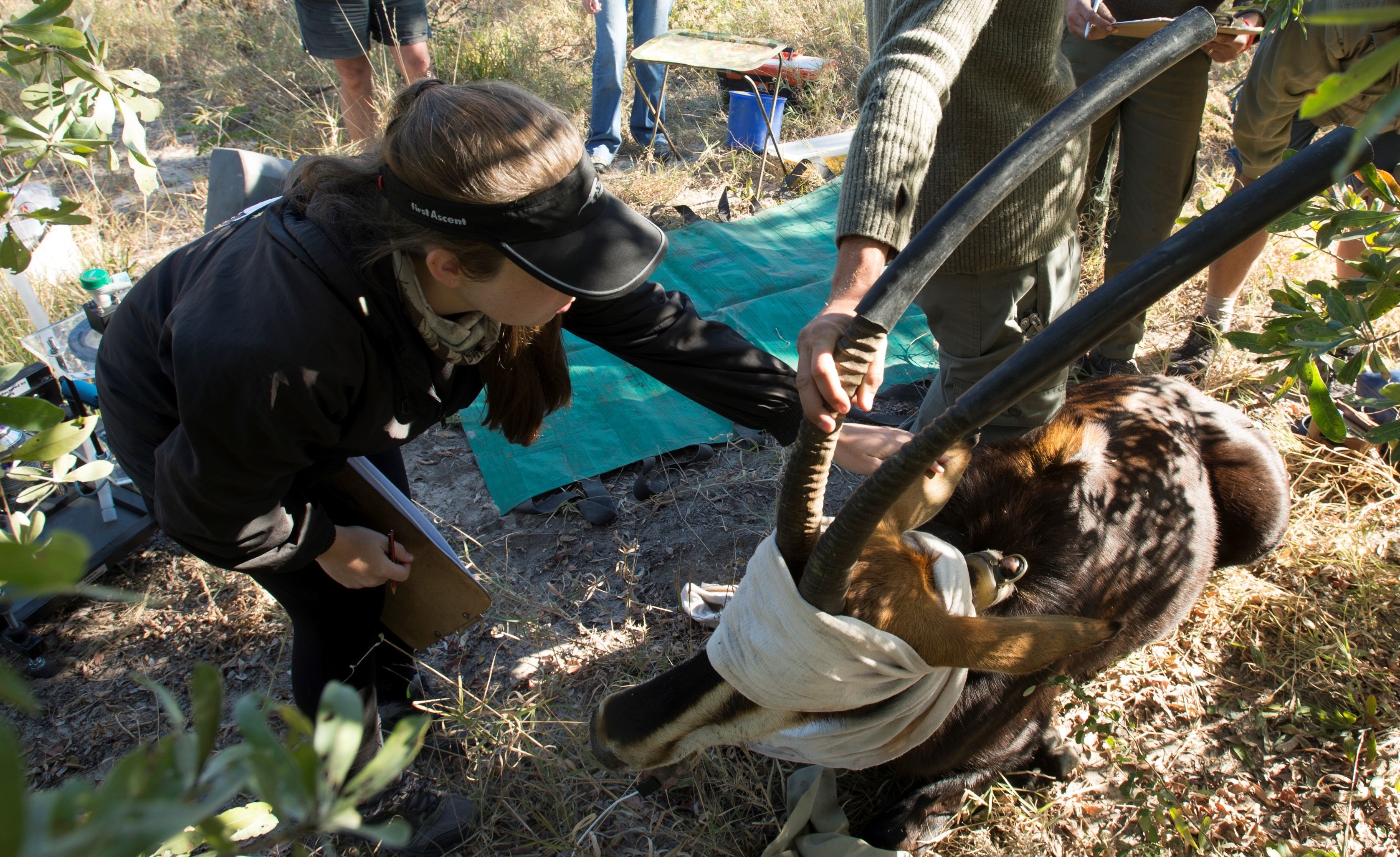 Kiara Avelyen Haylock is a PhD student at the University of the Witwatersrand (South Africa) investigating the responses of free-ranging sable antelope (Hippotragus niger niger) to stressful environmental conditions in the Kavango Zambezi (KaZa) Transfrontier Conservation Area. Kiara is collecting a comprehensive ecophysiological dataset detailing how a rare, specialist antelope species alters its movements, behavior, and physiology in response to high heat load, aridity, and resource stress. The outcomes of her research will ultimately contribute to the improved conservation and management of not only a rare African antelope species but specialist species in general, particularly in the face of climate change.
Kiara Avelyen Haylock is a PhD student at the University of the Witwatersrand (South Africa) investigating the responses of free-ranging sable antelope (Hippotragus niger niger) to stressful environmental conditions in the Kavango Zambezi (KaZa) Transfrontier Conservation Area. Kiara is collecting a comprehensive ecophysiological dataset detailing how a rare, specialist antelope species alters its movements, behavior, and physiology in response to high heat load, aridity, and resource stress. The outcomes of her research will ultimately contribute to the improved conservation and management of not only a rare African antelope species but specialist species in general, particularly in the face of climate change.
2018 Award Winners
Yadok Biplang Godwill is currently pursuing a Ph.D. in ecology at the University of Canterbury (New Zealand). His work is focused on understanding the seed-dispersal effectiveness of African giant pouched rats (Cricetomys sp.) in an Afromontane forest in his home country of Nigeria using a combination of camera trapping, live trapping, and seed-removal experiments. Yadok will use funds from his award to purchase camera traps and associated hardware. Results from his ambitious field study will provide useful information for the management of large-seeded tree species that have lost their large-bodied primary seed dispersers (chimpanzees in this case).
Ernest Fotsing is pursuing a Ph.D. at the University of Dschang (Cameroon). For his dissertation, he is studying the behavioral ecology of western gorillas in Campo’o Ma’an National Park (South Cameroon) as they adapt to increasing anthropogenic pressure and ecotourism. Funding from ASM will support his team of intrepid field biologists and trackers as they record information on local climate, vegetation, plant phenology, gorilla behavior, and human activity. In addition to providing much-needed data on basic gorilla ecology in the park, Ernest’s research will inform the sustainable-use strategy for one of Cameroon’s key conservation areas.
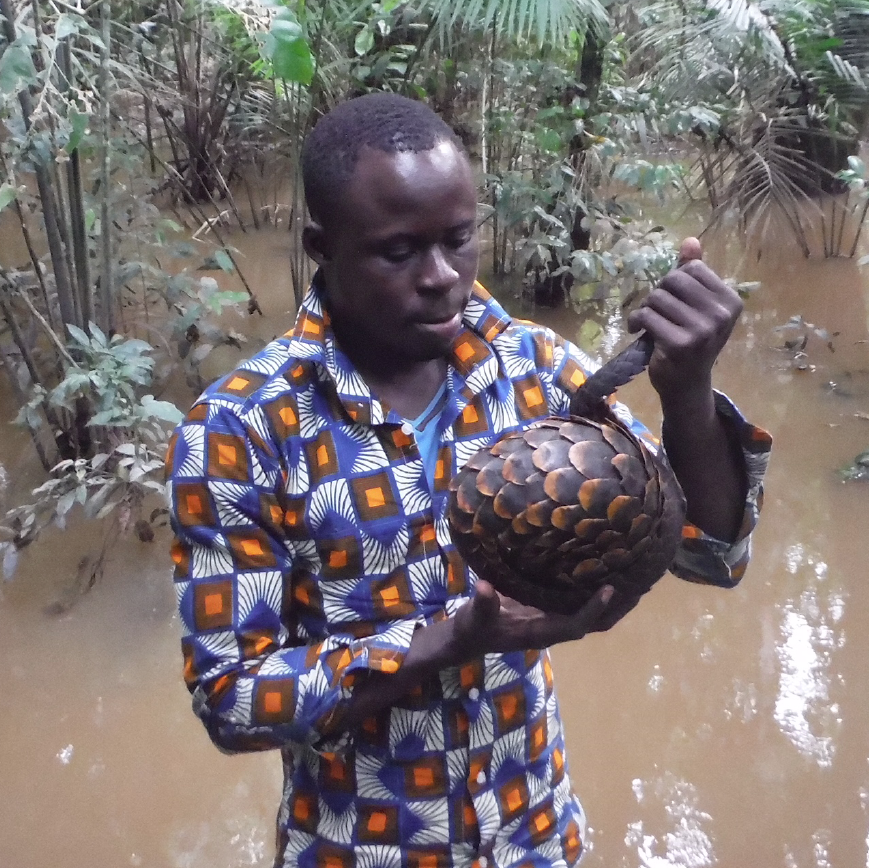 Brou Guy-Mathieu Assovi is a Ph.D. student at Felix Houphouët-Boigny University (Cote d’Ivoire) studying pangolins in and around the largest forested national park (Tai) in Cote d’Ivoire and its only recognized community conservation area. All three pangolin species known to occur in the area are exploited for bushmeat, yet little is known about their ecology, making it difficult to prioritize areas and habitats for conservation. Brou’s research is focused on the Black-bellied Pangolin (Phataginus tetradactyla)—the least-studied of Africa’s pangolins—as well as the Giant Pangolin (Smutsia gigantea), but he will also collect data on the White-bellied Pangolin (P. tricuspis). Brou will use his award to purchase telemetry equipment and pay local field assistants in his effort to capture and radiotrack up to 30 pangolins. He and his team will collect data on habitat, movement, behavior, and prey selection, while also investigating local community use of pangolins as an important source of protein. Collectively, these critical baseline data will form the basis of a national pangolin management action plan and will be a platform to raise awareness about the need to protect pangolins throughout West Africa.
Brou Guy-Mathieu Assovi is a Ph.D. student at Felix Houphouët-Boigny University (Cote d’Ivoire) studying pangolins in and around the largest forested national park (Tai) in Cote d’Ivoire and its only recognized community conservation area. All three pangolin species known to occur in the area are exploited for bushmeat, yet little is known about their ecology, making it difficult to prioritize areas and habitats for conservation. Brou’s research is focused on the Black-bellied Pangolin (Phataginus tetradactyla)—the least-studied of Africa’s pangolins—as well as the Giant Pangolin (Smutsia gigantea), but he will also collect data on the White-bellied Pangolin (P. tricuspis). Brou will use his award to purchase telemetry equipment and pay local field assistants in his effort to capture and radiotrack up to 30 pangolins. He and his team will collect data on habitat, movement, behavior, and prey selection, while also investigating local community use of pangolins as an important source of protein. Collectively, these critical baseline data will form the basis of a national pangolin management action plan and will be a platform to raise awareness about the need to protect pangolins throughout West Africa.
2017 Award Winners
Maryanne Gitari is currently pursuing a M.Sc. degree in Biology of Conservation at the University of Nairobi, Kenya and is also an intern at National Museums of Kenya. Her work is based on Mount Kenya ecosystems and is focused on quantifying prey selection of mountain populations of leopard and hyenas, using DNA metabarcoding, hair microscopy, and camera trapping. Her work is essential in management of these apex carnivores as little data is available for montane populations, thereby limiting conservation information for these declining apex carnivores
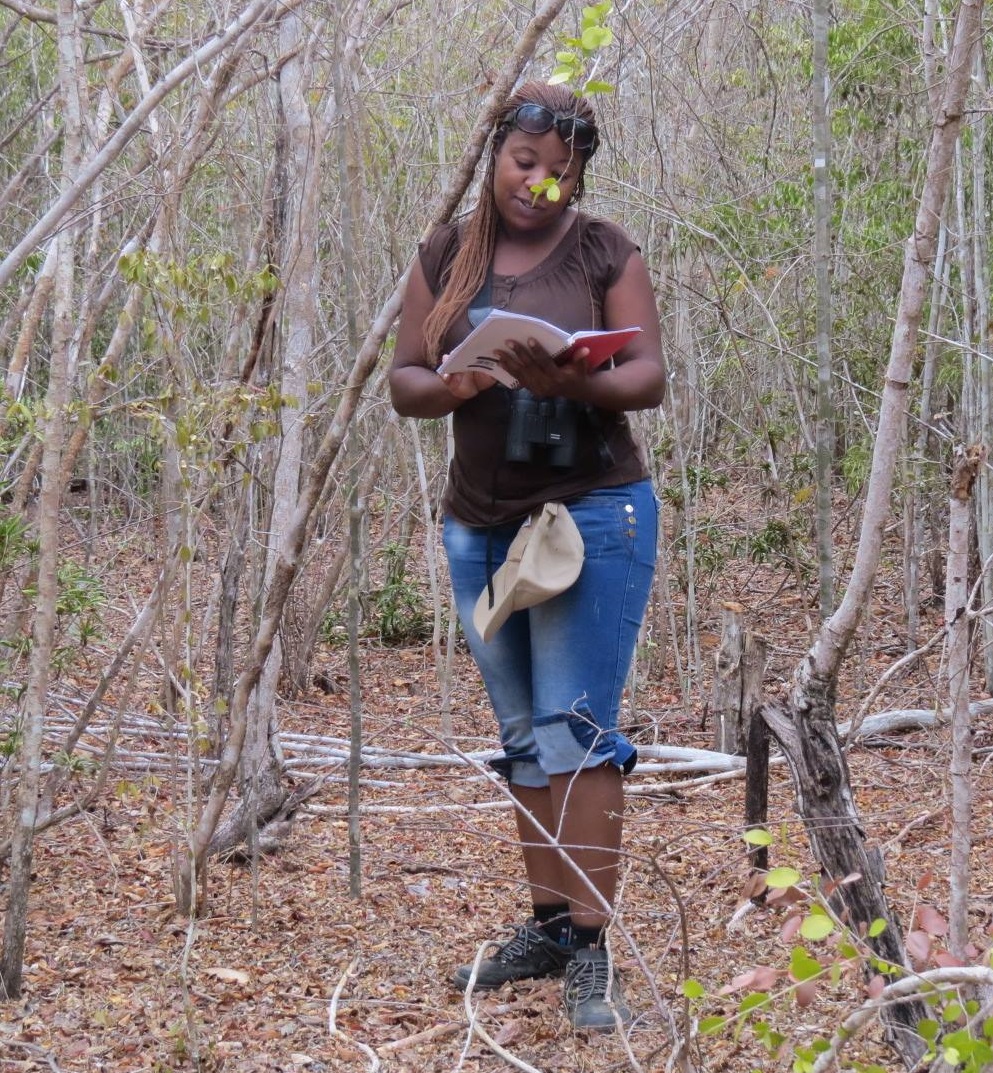
Cynthia Mapendere a Zimbabwean conservationist doing her MSc in Environmental Ecology with the University of Pretoria, South Africa. She is interested in the dynamics and implications of human and wildlife interactions. Her current work focuses on the ecology and epidemiology of Africa Swine Fever Virus and Foot and Mouth Disease in the wild and domestic suids in Ndumo Game Reserve, South Africa adjacent to communal areas. Her research will detail levels of interactions between the domestic and wild suids populations and hotspots of possible of disease transmission. In addition to enabling responsible authorities to put measures to curb disease transmission, her work will also facilitate the crafting of effective intervention measures in case of disease outbreaks.
2016 Award Winners
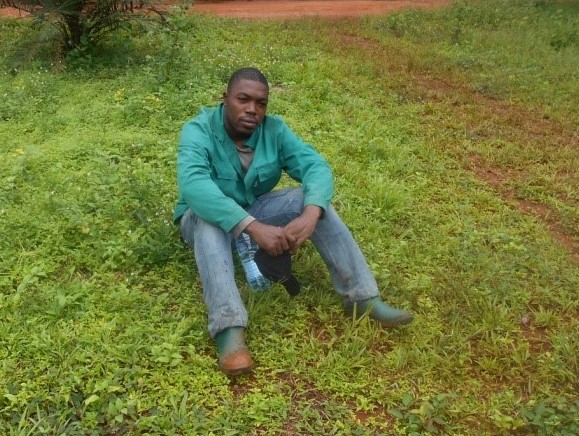 Yannick Djougeuela is a Cameroonian MSc student at the University of Yaoundé, Cameroon. He is interested in applications of GIS to the conservation of tropical primates. With officials in the Korup National Park, he is estimating chimpanzee density and conducting structured interviews with local peoples to curb increasing rates of poaching of primates (which include chimpanzees, drills, Preuss's red colobus, and red-eared guenons).
Yannick Djougeuela is a Cameroonian MSc student at the University of Yaoundé, Cameroon. He is interested in applications of GIS to the conservation of tropical primates. With officials in the Korup National Park, he is estimating chimpanzee density and conducting structured interviews with local peoples to curb increasing rates of poaching of primates (which include chimpanzees, drills, Preuss's red colobus, and red-eared guenons).
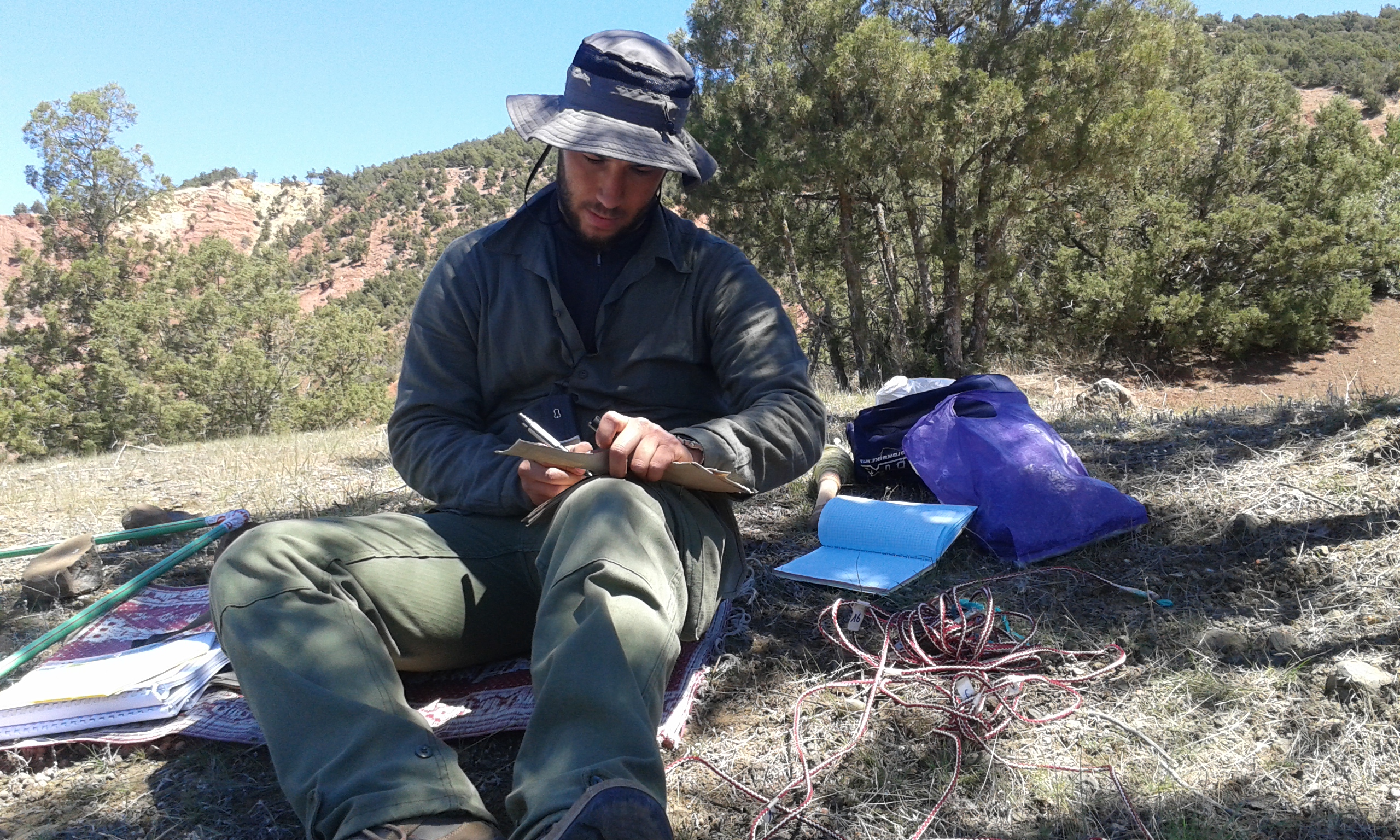 Radouane Oumrrar is Moroccan MSc student at Cadi Ayyad University at Marrakech, Morocco. He is interested in ecology and conservation of endangered large mammals, particularly ungulates. In collaboration Moroccan Forests & Waters Service, he is conducting thesis research on the demography and conservation of one of the most endangered large mammals in North Africa, the Barbary sheep (Ammotragus lervia) in the Western High Atlas mountains. He is trying to improve the conservation status of this population and its natural habitat with practical recommendations from his investigations for a conservation and management plan.
Radouane Oumrrar is Moroccan MSc student at Cadi Ayyad University at Marrakech, Morocco. He is interested in ecology and conservation of endangered large mammals, particularly ungulates. In collaboration Moroccan Forests & Waters Service, he is conducting thesis research on the demography and conservation of one of the most endangered large mammals in North Africa, the Barbary sheep (Ammotragus lervia) in the Western High Atlas mountains. He is trying to improve the conservation status of this population and its natural habitat with practical recommendations from his investigations for a conservation and management plan.
2015 Award Winners
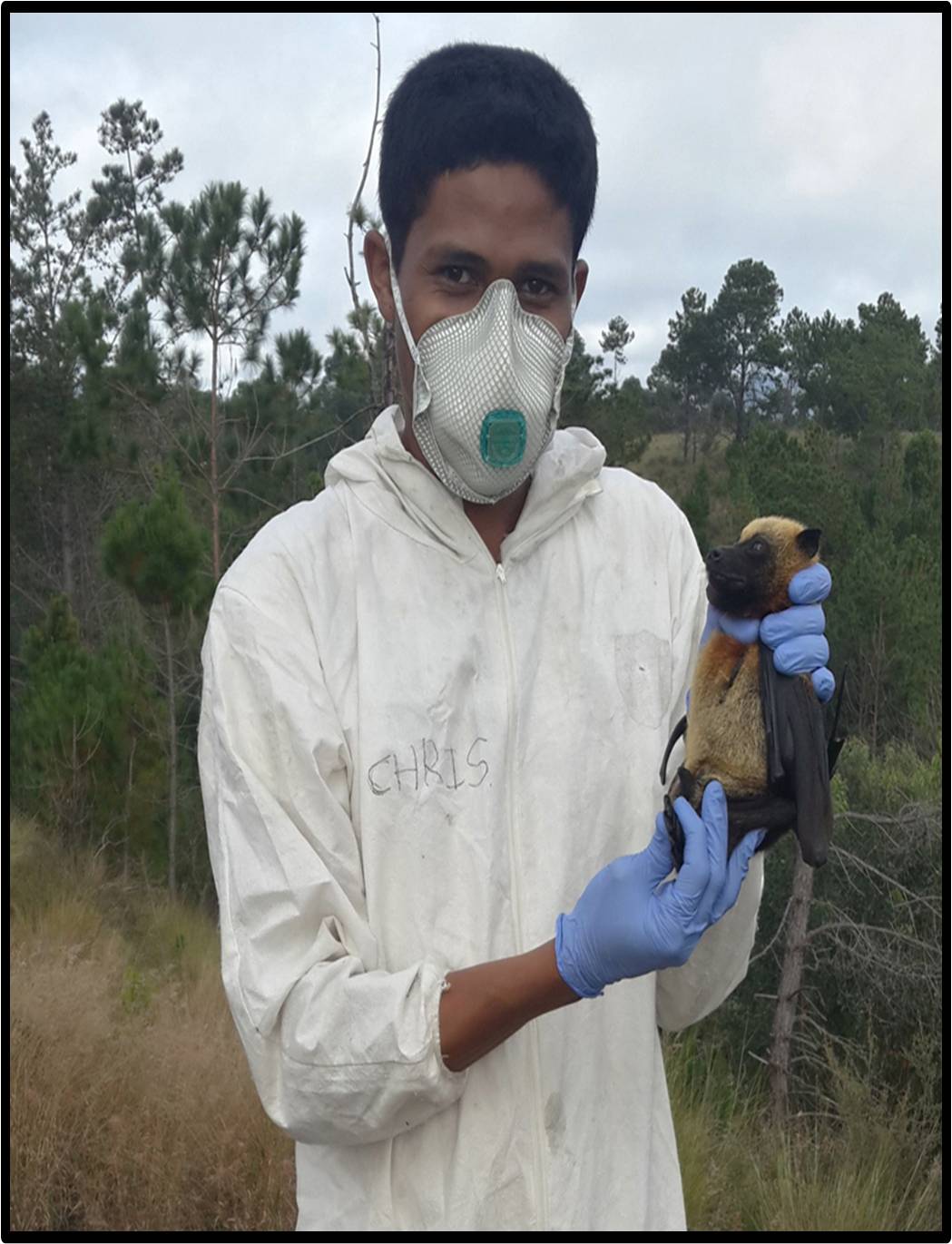 Christian Ranaivoson is a doctoral student at the University of Antananarivo and an intern at Institute Pasteur of Madagascar. His work is focused on the distribution and transmission of protozoan blood parasites of Madagascan fruit bats. His goal is to obtain patterns of distribution of each parasite, and to confirm transmission rates between three species of fruit bats.
Christian Ranaivoson is a doctoral student at the University of Antananarivo and an intern at Institute Pasteur of Madagascar. His work is focused on the distribution and transmission of protozoan blood parasites of Madagascan fruit bats. His goal is to obtain patterns of distribution of each parasite, and to confirm transmission rates between three species of fruit bats.
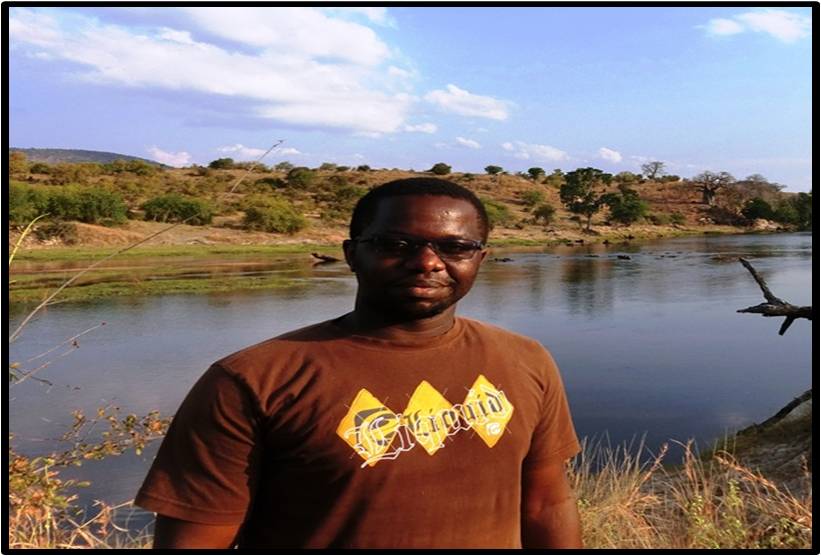 Arthur Muneza is a Master’s student at Michigan State University and is a Rwandan citizen. He is examining the prevalence and severity of Giraffe skin disease in Ruaha National Park, Tanzania. This disease afflicts limbs of individuals and may make them more vulnerable to lion predation, which Arthur hopes to quantify through his work.
Arthur Muneza is a Master’s student at Michigan State University and is a Rwandan citizen. He is examining the prevalence and severity of Giraffe skin disease in Ruaha National Park, Tanzania. This disease afflicts limbs of individuals and may make them more vulnerable to lion predation, which Arthur hopes to quantify through his work.
2014 Award Winners
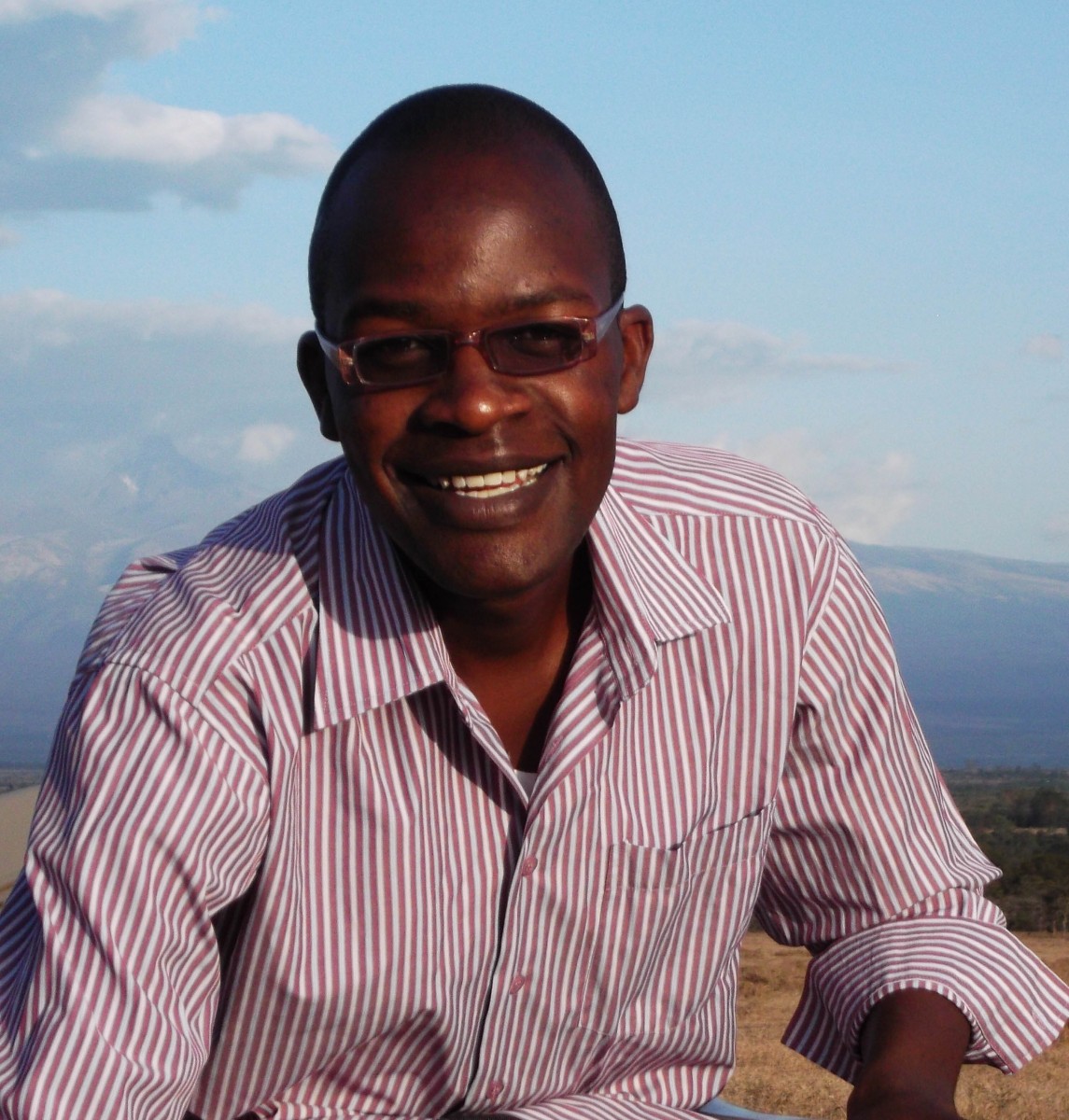 George Omondi Paul is an early career wildlife veterinarian and is currently pursuing a M.Sc. degree in Veterinary Epidemiology and Economics at the University of Nairobi, in Kenya. His work focusses on disease transmission dynamics between wildlife and livestock with the aim of promoting co-existence between the two groups. George has one paper accepted for publication and another is under review.
George Omondi Paul is an early career wildlife veterinarian and is currently pursuing a M.Sc. degree in Veterinary Epidemiology and Economics at the University of Nairobi, in Kenya. His work focusses on disease transmission dynamics between wildlife and livestock with the aim of promoting co-existence between the two groups. George has one paper accepted for publication and another is under review.
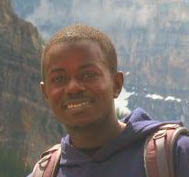 Tobias Ochieng Otieno is a M.Sc. student at Karatina University in Kenya, where his work focuses on foraging preferences and predation risk of ungulates in human-occupied landscapes. To date, Tobias has authored or coauthored two papers, with another in revision. He has delivered many presentations on the conservation and foraging ecology of mammals in Kenya, particularly emphasizing ungulates and small mammals.
Tobias Ochieng Otieno is a M.Sc. student at Karatina University in Kenya, where his work focuses on foraging preferences and predation risk of ungulates in human-occupied landscapes. To date, Tobias has authored or coauthored two papers, with another in revision. He has delivered many presentations on the conservation and foraging ecology of mammals in Kenya, particularly emphasizing ungulates and small mammals.
Recipients
2010-2019
- 2014—Tobias Ochieng Otieno, Karatina University, Kenya
- 2014—George Omondi Paul, University of Nairobi, Kenya
- 2015—Arthur Munez, MIchigan State University
- 2015—Christian Ranaivoson, University of Antananarivo, Madagascar
- 2016—Radouane Oumrrar, Cadi Ayyad University at Marrakech, Morocco
- 2016—Yannick Djougeuela, University of Yaoundé, Cameroon
- 2017—Cynthia Mapendere, University of Pretoria
- 2017—Maryanne Gitari, University of Nairobi
- 2018—Brou Guy-Mathieu Assovi, Felix Houphouët-Boigny University, Cote d’Ivoire
- 2018—Ernest Fotsing, University of Dschang Cameroon
- 2018—Yadok Biplang Godwill, University of Canterbury, New Zealand
- 2019—Kiara Avelyn Haylock, University of Wiwatersrand (South Africa)
- 2019—Daniel Konzin, University of Cape Coast (Ghana)
- 2019—Levi Matana, The Nelson Mandela African Institution of Science and Technology (Tanzania)
- 2019—Prisca Razafy, University of Antananarivo (Madagascar)
2020+
- 2020—Valorian Douatsop, University of Dschang (Cameroon)
- 2020—Charles Emogor, University of Cambridge and Wildlife Conservation Society (United Kingdom)
- 2020—Clinton Factheu, University of Yaoundé I (Cameroon)
- 2020—Zabibu Kabalika, University of Glasgow (United Kingdom)
- 2020—Aristide Sock Bell, Jr., University of Douala (Cameroon)
- 2021—Osvaldo Abrão, Zambezi University (Mozambique)
- 2021—Douglas Kamaru, University of Nairobi (Kenya)
- 2021—Cyrus Kavwele, University of Glasgow (United Kingdom)
- 2021—Makabudi Valery Phakoago, University of the Witwatersrand (South Africa)
- 2021—Veronarindra Ramananjato, University of California Berkeley (USA)
- 2022—Omobayo Ghislain Zouffoun, University of Abomey-Calavi (Benin)
- 2022—Felaniaina Rafenoarisoa, University of Antananarivo (Madagascar)
- 2022—Raymond Owino, University of Nairobi (Kenya)
- 2022—Alexandra Howard, University of the Free State (South Africa)
- 2022—Ryan Forbes, Nelson Mandela University (South Africa)
- 2023—Katinka Botha, University of the Witwatersrand (South Africa)
- 2023—Judicaël Régis Kema Kema, University of La Rochelle (France) and Omar Bongo University (Gabon)
- 2023—Kiros Welegerima, Sokoine University of Agriculture (Tanzania)
- 2024—Mohamed Hussein Ali, (Kenya)
- 2024—Patrice Delagnon Assou, (Togo)
- 2024—Keneilweone Kejekgabo, (Botswana)
- 2024—Howard Maimbo, (Zambia)
- 2024—Getachew Mulualem, (Ethiopia)
- 2024—Elijah Okwuono,(Nigeria)
- 2024—Mauricette Marie Rajaobelina, (Madagascar)
